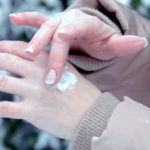Suzan Obagi, M.D., associate professor of Dermatology, associate professor of Plastic Surgery, director, UPMC Cosmetic Surgery & Skin Health Center weighs in on avoiding skin irritation from protective face masks.

Susan Obagi, M.D.
As health care providers, we are used to wearing masks for certain procedures or for specific patient interactions. But now, with the entire country facing COVID-19, we are finding that we must wear masks for extended periods of time, including when we are out and about in the community.
Even those who are not health care providers are now required to wear a mask while at work and running errands.
For many, this has resulted in a number of skin issues— from flaring of eczema to worsening of acne.
The skin needs a little breathing room, so it is important to be careful with what we apply to our face before donning our masks, since they can block air circulation.
Here are a few tips to help protect your skin:
• Wash your skin well and apply a light moisturizer or, if your skin is very dry, use a cream. Try to avoid ointments as they may be too greasy. Furthermore, ointments might adversely affect the seal of certain tight-fitting masks.
• Apply a light sunscreen lotion or cream, preferably a mineral-based sunscreen containing titanium dioxide or zinc oxide. Be aware that certain chemical sunscreen ingredients may wear down the integrity of rubber or elastic materials on the mask.
• Make sure your mask covers your nose and mouth snugly, but that it is not so tight that you are bruising your skin.
• Avoid wearing makeup or foundation under your mask. This may cause your skin to break out.
• If your glasses or goggles fog up while wearing a mask, use “paper-tape” or “micropore” tape to tape the mask across the bridge of your nose and onto the cheeks to prevent your breath from fogging up your eye protection. This type of tape is the least likely to pull or damage your skin when you remove the mask.
• Once you remove your mask for the day, wash your skin again and apply a light moisturizing lotion. If you have eczema or dry, sensitive skin, you may want to apply a heavier moisturizer in the form of a cream.
• Make sure to wash your hands with soap and water after removing your mask.
• If you have areas on your skin that are raw or chaffed, apply an ointment to these areas after you are finished wearing your mask for the day and then reapply this ointment at bedtime. A few well-tolerated ointments are Aquaphor Healing Ointment, Vaseline Petroleum Jelly or Vaniply Ointment.
• For those wearing cloth masks, make sure you launder them daily per CDC guidelines, and to minimize bacteria growths on them, which can cause acne. Use regular detergent with no bleach as the bleach may breakdown some mask materials.
• If your ears hurt from the elastic bands, try to switch to a cloth mask (when in non-medical settings) with cloth ear loops.
- For further information on wearing, making or sterilizing facemasks, visit the CDC website for the latest guidelines. For information about COVID-19, visit UPMC.com/coronavirus.








